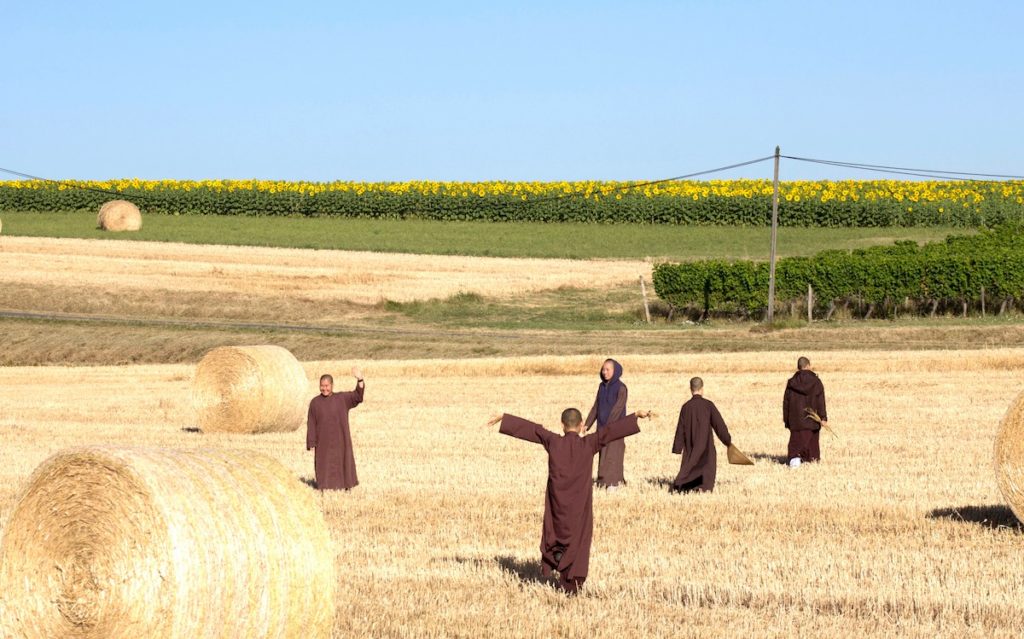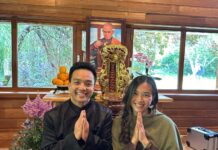Click here to read Part I.
Part II
Q: What is the role of sangha building and of being around people who support us in our practice?
Brother Bieu Hien: I think it’s hugely important, maybe the most important thing. The point I’m driving at here is that, in Buddhism, it’s always about a middle way. It’s not about compromise; it’s about not being caught in either of the ways. So I would say “Go as a river; follow the collective energy” is tragically maladjusted to city life. It’s not to say that we don’t need the collective energy; it’s actually the only thing that’s going to get us out of this tangle, as the Buddha described it, is insight. We need supportive conditions for insight to arise. Some of those can be internal; some of those can be in the collective.
When we understand things like the interbeing of inside and outside, of individual and collective, of space and time, we don’t need to have a big concern about which river we’re in at this moment. There’s a choice that’s available to us about which river we want to flow with in any given moment. We can get in touch with that. And at that point, when we can enter into that kind of space, there’s not… There’s no individual. There’s no collective. There’s no here or there. There’s no us and them.

It’s about directly knowing what direction you want to go in this moment. I think Thay tells us to build a Sangha because naturally when we can enter into that flow based on the Four Noble Truths, based on an insight about compassion, we understand we need it. When we can see the naivety of the idea of a purely individual happiness, we see that we need to work and be together. Whether we know it or not, whether we have that insight or not, sangha building makes sense because it’s creating conditions for us to go in the direction of that insight. But the Sangha is only one of the Three Jewels. We still need the Buddha, that is to say someone who has traveled much further on the path than we have. And we need the Dharma, the teachings.
My concern with Sanghas that are out there right now is: Can we find a way to support the Sangha builders who are serving? I think an aspiration to serve is a major catalyst for transformation and insight. So can we create the kinds of spaces and practices that can incubate that insight? I don’t want to see inspired practitioners who end up feeling that running a Sangha is a chore and that the real practice is coming once or twice a year to recharge in Plum Village. Or who end up wandering off to other traditions.
I don’t have any problem with other traditions, but I think it’s a shame if people bounce out of ours because they don’t have the chance to touch the depth. Thay is inviting us into something that is available in every moment, regardless of where we’re at, what we’re doing. That’s radical and it’s the kind of vision that inspires me, and that I think should be very inspiring for lay people.
Q: You´ve been a monk for eight years now. According to your experience, do you think it is possible for a layperson to give the same amount of commitment and priority to the practice as the monastics do?
Brother Bieu Hien: What a nice question. I think one of the most important conditions for developing a deep practice is to have a clear form, and the monastic life provides a clear form. It’s set already. As a lay person, we also need a clear form and that can be a bit confusing because that form isn’t set. Also because as lay people in the West, with our emphasis on individuality, we tend to get enamored with the form of our life and to spend a lot of time modifying it.
Where should I live? What should my job be, etc.? For sure, the personal developmental side I kind of alluded to is a huge component to developing a deep practice in lay life, because you need to be able to navigate your lay life without being totally overwhelmed in this sea of possibility. That’s why precepts are important. Not just the broad strokes of the Five Mindfulness Trainings, but a real, personalized version of that framework.
That means you know what you do. You know what you don’t do. You don’t spend all your time running around. Some of the most impressive practitioners I’ve met are lay people. One, a very lovely woman from Michigan, got into the practice when she was raising three kids and running her own business. She never stopped doing those things and she ended up deciding that for her it never felt right to make money from teaching meditation. She always had to make meditation something that could be expressed through all of the different avenues of her life: parenting, couple life, work and then obviously through being a teacher and mentor to a Sangha there. And she was able to do that because she made clarity, ease, and presence a very high priority in her life.
She had what I would call precepts. For instance she checked her phone once a day, and her email once a week. Once she received an email from an angry member of the editorial council for her regional Sangha. They were working on a project together and this person said her unresponsiveness was ruining the process for the rest of the group. So she emailed the whole group and asked them, is this true? Do you feel that the group would be better off without my participation? Because if so, I can leave the group. But I only answer my emails once a week.
Another essential condition that I’ve seen in these people is strong, long-term mentorship, which is why I keep thinking that we need to find structures to put this in place for our Sanghas. These people worked with a teacher or mentor over many years. I can see the importance of that in my own practice life. I didn’t work much with Thay, but I’ve had the benefit of good spiritual friends both within and without the community. They have challenged me over and over again to come back and examine my priorities, to see where I’m taking the non-essential thing to be the essential thing, and then to let go of that foolishness.
That’s the heart of the practice and the Sangha is a big support. We need to have somebody that we trust, that we can talk to, someone that can share well-tested insights into all kinds of different life situations. That’s the kind of person I want to develop into as a monk. But if you’re trying to develop depth as a lay practitioner, you may well want to find established lay teachers to talk to and to get input from. When it comes to practice in the world, they should be the experts.
Interviewed by Annica on June 30, 2019 in Upper Hamlet, Plum Village and transcribed by Elaine Fisher.

















